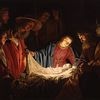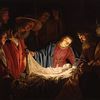7.6.2013 | 10:28
Vísindamenn fjalla um uppruna lífs
Ţegar ég rökrćđi viđ fólk um uppruna lífs ţá kemur fljótlega í ljós ađ fólk veit afskaplega lítiđ um ţetta efni. Fólk virđist ađalega fá sínar upplýsingar um ţetta efni úr einhverjum einföldum skólabókum sem láta sem svo ađ ţetta sé ekkert mál og viđ vitum nokkurn veginn hvernig ţetta gerđist.
Ţess vegna vil ég ađeins taka saman hvađ vísindamenn hafa sagt um uppruna lífs í gegnum tíđina og síđan fyrirlestur sem fer ýtarlega í gegnum ţetta efni.
Campbell, Jeremy C - "Grammatical Man: Information, Entropy, Language and Life," [1982], Penguin Books
Evidently nature can no longer be seen as matter and energy alone. Nor can all her secrets be unlocked with the keys of chemistry and physics, brilliantly successful as these two branches of science have been in our century. A third component is needed for any explanation of the world that claims to be complete. To the powerful theories of chemistry and physics must be added a late arrival: a theory of information. Nature must be interpreted as matter, energy, and information.Polanyi, Michael "Life Transcending Physics and Chemistry," Chemical & Engineering News, Vol. 45, No. 35, August 21, 1967, pp.54-66, p.56
Biological systems, like machines, have, therefore, functions and forms inexplicable by
chemical and physical laws. The argument that the DNA molecule determines genetic processes in living systems does not indicate reducibility. A DNA molecule essentiality transmits information to a developing cell. Similarly, a book transmits information. But the transmission of the information cannot be represented in terms of chemical and physical principles. In other words, the operation of the book is not reducible to chemical terms. Since DNA operates by transmission of (genetic) information, its function cannot be described by chemical laws either. The life process is essentially the development of a fertilized cell, as the result of information imparted by DNA. Transmission of this information is nonchemical and nonphysical, and is the controlling factor in the life process. The description of a living system therefore transcends the chemical and physical laws which govern its constituents.
Kuppers, Bernd-Olaf. [researcher, Max Planck Institute for Biophysical Chemistry], "Information and the Origin of Life," [1986], MIT Press: Cambridge MA, 1990, p.170
The problem of the origin of life is clearly basically equivalent to the problem of the origin of biological information. In accordance with this, the idea of biological information emerges as *the* fundamental concept in the physicochemical theory of the origin of life.
Grasse, Pierre-P. Former Chair of Evolution, Sorbonne University and ex-president of the French Academie des Sciences], "Evolution of Living Organisms: Evidence for a New Theory of Transformation," Academic Press: New York NY, 1977, p.2
Any living being possesses an enormous amount of "intelligence," very much more than is necessary to build the most magnificent of cathedrals. Today, this "intelligence" is called "information," but it is still the same thing. It is not programmed as in a computer, but rather it is condensed on a molecular scale in the chromosomal DNA or in that of any other organelle in each cell. This "intelligence" is the sine qua non of life. If absent, no living being is imaginable. Where does it come from? This is a problem which concerns both biologists and philosophers and, at present, science seems incapable of solving it.Grasse, Pierre-P. Former Chair of Evolution, Sorbonne University and ex-president of the French Academie des Sciences], "Evolution of Living Organisms: Evidence for a New Theory of Transformation," Academic Press: New York NY, 1977, p.2
When we consider a human work, we believe we know where the `intelligence' which fashioned it comes from; but when a living being is concerned, no one knows or ever knew, neither Darwin nor Epicurus, neither Leibniz nor Aristotle, neither Einstein nor Parmenides. An act of faith is necessary to make us adopt one hypothesis rather than another. Science, which does not accept any credo, or in any case should not, acknowledges its ignorance, its inability to solve this problem which, we are certain, exists and has reality. If to determine the origin of information in a computer is not a false problem, why should the search for the information contained in cellular nuclei be one?Hoyle, Fred [late mathematician, physicist and Professor of Astronomy, Cambridge University], "The Universe: Past and Present Reflections," Annual Review of Astronomy and Astrophysics, Vol. 20, 1982, pp.1-35, p.5
Could the vast store of information necessary for the development of biology have been accumulated in only ten billion years? If you are inclined to think that it could, take a look at what we know of the most recent four billion years, and what many people believe to be the beginning of the Universe in a big-bang cosmology. Such a beginning occurs in a holocaust of radiation little suited to harboring the delicate organization of biology, while the past three to four billion years on the Earth have yielded no change in the intricate biochemical complexity of life. The enzymes go essentially unchanged from the cells of a human to the most primitive single cells, which are thought to be typical of life as it existed in the early days of the Earth. Hence we have a situation without a promising beginning and with no change of the crucial aspects of the life system over the last one third to one half of the ten billion year time interval. Where then did the miracle of information contained in biological systems arise?Orgel, Leslie E. [Adjunct Professor, University of California-San Diego], "Darwinism at the very beginning of life," New Scientist, 15 April 1982, p.151
The origin of the genetic code is the most baffling aspect of the problem of the origins of life and a major conceptual or experimental breakthrough may be needed before we can make any substantial progress.Hoyle, Fred [physicist and Professor of Astronomy, Cambridge University], "Mathematics of Evolution," [1987], Acorn Enterprises: Memphis TN, 1999, p.20
Two points of principle are worth emphasis. The first is that the usually supposed logical inevitability of the theory of evolution by natural selection is quite incorrect. There is no inevitability, just the reverse. It is only when the present asexual model is changed to the sophisticated model of sexual reproduction accompanied by crossover that the theory can be made to work, even in the limited degree to be discussed .... This presents an insuperable problem for the notion that life arose out of an abiological organic soup through the development of a primitive replicating system. A primitive replicating system could not have copied itself with anything like the fidelity of present-day systems .... With only poor copying fidelity, a primitive system could carry little genetic information without L [the mutation rate] becoming unbearably large, and how a primitive system could then improve its fidelity and also evolve into a sexual system with crossover beggars the imagination."Monod, Jacques [biochemist, Nobel Prize 1965, Director, Pasteur Institute, France], "Chance and Necessity: An Essay on the Natural Philosophy of Modern Biology", [1971], Transl. Wainhouse A., Penguin Books: London, 1997, reprint, pp.142-143.
The development of the metabolic system, which, as the primordial soup thinned, must have "learned" to mobilize chemical potential and to synthesize the cellular components, poses Herculean problems. So also does the emergence of the selectively permeable membrane without which there can be no viable cell. But the major problem is the origin of the genetic code and of its translation mechanism. Indeed, instead of a problem it ought rather to be called a riddle. The code is meaningless unless translated. The modern cell's translating machinery consists of at least fifty macromolecular components which are themselves coded in DNA: the code cannot be translated otherwise than by products of translation. It is the modern expression of omne vivum ex ovo. When and how did this circle become closed? It is exceedingly difficult to imagine.Hofstadter, Douglas R., [mathematician and historian], "Godel, Escher, Bach: an Eternal Golden Braid," [1979], Vintage: New York NY, 1980, reprint, p.548
A natural and fundamental question to ask, on learning of these incredibly intricately interlocking pieces of software and hardware is: "How did they ever get started in the first place?" It is truly a baffling thing. One has to imagine some sort of a bootstrap process occurring, somewhat like that which is used in the development of new computer languages-but a bootstrap from simple molecules to entire cells is almost beyond one's power to imagine. There are various theories on the origin of life. They all run aground on this most central of all central questions: "How did the Genetic Code, along with the mechanisms for its translation (ribosomes and tRNA molecules), originate?" For the moment, we will have to content ourselves with a sense of wonder and awe, rather than with an answer.Dr. Francis H. Crick
What is so frustrating for our present purpose is that it seems almost impossible to give any numerical value to the probability of what seems a rather unlikely sequence of events... An honest man, armed with all the knowledge available to us now, could only state that in some sense, the origin of life appears at the moment to be almost a miracle.
Svo ađ lokum, fyrirlestur eftir Stephen Meyers ţar sem hann fer ýtarlega yfir uppruna lífs.
Meginflokkur: Vísindi og frćđi | Aukaflokkar: Heimspeki, Trúmál, Trúmál og siđferđi | Facebook
Um bloggiđ
Mofa blogg
Fćrsluflokkar
- Bloggar
- Bækur
- Dægurmál
- Ferðalög
- Fjármál
- Fjölmiðlar
- Heilbrigðismál
- Heimspeki
- Íþróttir
- Kjaramál
- Kvikmyndir
- Lífstíll
- Ljóð
- Löggæsla
- Mannréttindi
- Matur og drykkur
- Menning og listir
- Menntun og skóli
- Samgöngur
- Sjónvarp
- Spaugilegt
- Spil og leikir
- Stjórnmál og samfélag
- Sveitarstjórnarkosningar
- Tónlist
- Trúmál
- Trúmál og siðferði
- Tölvur og tækni
- Umhverfismál
- Utanríkismál/alþjóðamál
- Vefurinn
- Viðskipti og fjármál
- Vinir og fjölskylda
- Vísindi og fræði
Tenglar
Kristnar síđur
Ýmislegt
Sköpun/ţróun
Síđur sem fjalla um sköpun/ţróun
- Detecting Design
- UnCommon descent Blogg síđa William Dembski um vitrćna hönnun
- Creation-Evolution Headlines Síđa sem fjallar um fréttir tengdar sköpun ţróun
- EvolutionNews Síđa sem fjallar um fréttir sem tengjast Vitsmunahönnun
Bloggvinir
- Bergur Thorberg
- Birgirsm
- Brosveitan - Pétur Reynisson
- Bryndís Böðvarsdóttir
- Daníel Þór Þorgrímsson
- Davíð S. Sigurðsson
- Davíð Örn Sveinbjörnsson
- Daði Einarsson
- Dóra litla
- Eva
- Eygló Hjaltalín
- Friðrik Páll Friðriksson
- Georg P Sveinbjörnsson
- Gladius
- Gunnar Ingi Gunnarsson
- Gunnlaugur Halldór Halldórsson
- Guðni Már Henningsson
- Guðrún Sæmundsdóttir
- Guðsteinn Haukur Barkarson
- Gísli Kristjánsson
- Halldóra Hjaltadóttir
- Halldóra Lára Ásgeirsdóttir
- Hjalti Rúnar Ómarsson
- Hörður Finnbogason
- Hörður Halldórsson
- Inga Helgadóttir
- Ingibjörg
- Ingvar Leví Gunnarsson
- Ingvar Valgeirsson
- Janus Hafsteinn Engilbertsson
- Jens Sigurjónsson
- Jóhann Hauksson
- Jóhann Helgason
- Jóhannes Ólafsson Eyfeld
- Jón Hjörleifur Stefánsson
- Jón Ríkharðsson
- Jón Valur Jensson
- Jónatan Gíslason
- Júdas
- Kristin stjórnmálasamtök
- Kristinn Theódórsson
- Kristinn Theódórsson
- Kristinn Ásgrímsson
- Linda
- Mama G
- Morgunstjarnan
- Nonni
- Omnivore
- Predikarinn - Cacoethes scribendi
- Pétur Eyþórsson
- Ragnar Birkir Bjarkarson
- Ragnar Kristján Gestsson
- Ragnar Steinn Ólafsson
- Ragnheiður Katla Laufdal
- Róbert Badí Baldursson
- Rósa Aðalsteinsdóttir
- Rödd í óbyggð, kristilegt félag
- Röddin
- Rúnar Kristjánsson
- Sigurður Þórðarson
- Sigvarður Hans Ísleifsson
- Steinar Immanúel Sörensson
- Styrmir Reynisson
- Svanur Gísli Þorkelsson
- Sverrir Halldórsson
- TARA
- TARA ÓLA/GUÐMUNDSD.
- Theódór Norðkvist
- Tryggvi Hjaltason
- Tímanna Tákn
- Unknown
- Vefritid
- Viðar Freyr Guðmundsson
- gudni.is
- Ólafur Jóhannsson
- Þarfagreinir
- Þórdís Ragnheiður Malmquist
- Alexander Steinarsson Söebech
- Árni Karl Ellertsson
- BookIceland
- Elísa Elíasdóttir
- Fanney Amelía Guðjonsson
- Friðrik Már
- Gestur Halldórsson
- Guðjón E. Hreinberg
- Gunnar Ingvi Hrólfsson
- Gunnar Jóhannesson
- Hulda Þórey Garðarsdóttir
- Jens Guð
- Karl Jóhann Guðnason
- Kristinn Ingi Jónsson
- Lífsréttur
- Mathieu Grettir Skúlason
- Tómas Ibsen Halldórsson
- Valur Arnarson
- Viktor
- Vilhjálmur Örn Vilhjálmsson
Heimsóknir
Flettingar
- Í dag (30.9.): 0
- Sl. sólarhring: 1
- Sl. viku: 12
- Frá upphafi: 0
Annađ
- Innlit í dag: 0
- Innlit sl. viku: 12
- Gestir í dag: 0
- IP-tölur í dag: 0
Uppfćrt á 3 mín. fresti.
Skýringar






Bćta viđ athugasemd [Innskráning]
Ekki er lengur hćgt ađ skrifa athugasemdir viđ fćrsluna, ţar sem tímamörk á athugasemdir eru liđin.